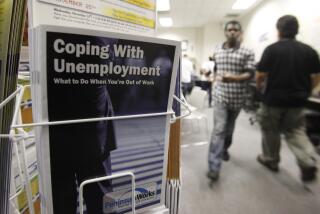SOUTHERN CALIFORNIA Job Market : PART TWO: GETTING AHEAD : Deducting Job-Hunting Costs
- Share via
As sharply as it cut deductible business items for employees, the new tax law left largely untouched the rules for deducting job-hunting expenses.
But it did add a threshold level for such deductions: Starting this year, job-hunting expenses can be deducted only to the extent that they exceed 2% of one’s adjusted gross income.
That means that if your adjusted gross is $30,000 and your job-hunting expenses are $750, you can deduct only $150--the total minus $600, which is 2% of $30,000.
Subject to that restriction, most reasonable expenses are still deductible as long as one itemizes deductions. These include advertising, resume preparation, travel expenses (such as to an interview) and employment agency fees.
As in any tax-related discussion, there are dozens of niceties here. First, the expenses must be incurred in a search for a new job in your existing line of work, although they do not have to result in your finding a new job. Similarly, if you are unemployed during the search, the expenses must be incurred within a “reasonable” time of your leaving your previous job.
Reimbursed expenses occasionally cause some income-reporting complications. Fees paid by employers or prospective employers need not be reported on tax returns. However, if you pay the fee and are later reimbursed, the reimbursement may have to be reported as income; you can compensate by itemizing the expense.
It should be remembered that the reduced rates and other new features of the tax code can also affect job-hunting expense deductibility. Because the new law phases out many old itemized deductions, including sales tax and consumer interest, many taxpayers may no longer have enough deductions to warrant itemizing, even with job-hunting costs thrown in.
Furthermore, the reduction in the top tax rate means that the value of every deductible dollar is lower this year than last.
More to Read
Inside the business of entertainment
The Wide Shot brings you news, analysis and insights on everything from streaming wars to production — and what it all means for the future.
You may occasionally receive promotional content from the Los Angeles Times.









